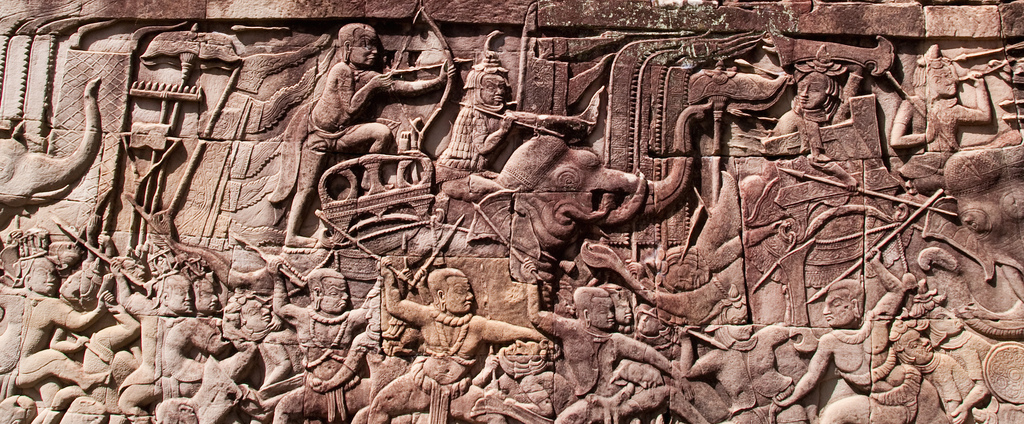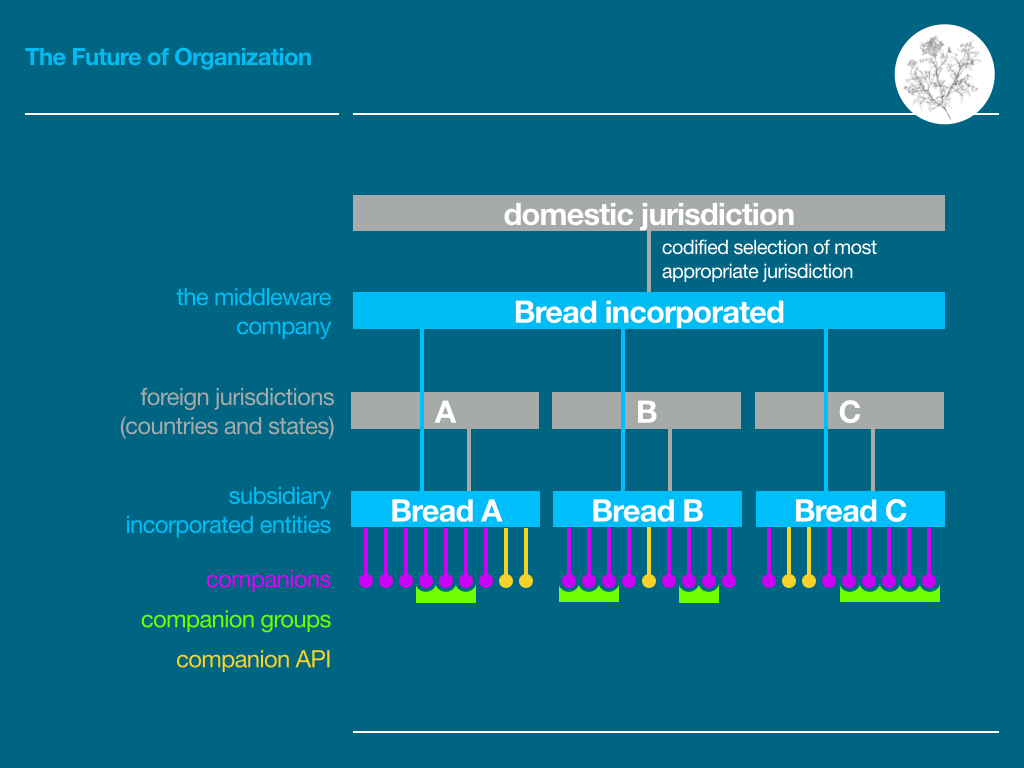
This post is about an exciting vista for organization, one that may sound unhuman on the face of it but which, in contrast, I think could serve human dignity very well.
I first presented it in my Future of Organization video May 23rd, a presentation that appears to have been well received (and the accompanying Slideshare accrued over 2000 views in the week). Given the variety and perceptiveness of the comments the video garnered I'm particularly pleased to have excused the presentation up front as being far from comprehensive. Pete Burden picked up on building inclusiveness and sustainability, and humanity, pointing me to this webpage on concious business. And soulfulness was at the heart of a similar exchange with Frederic Laloux, author of Reinventing Organizations. (I consequently elevated the book to the top of my to-read pile and at page 36 I'm enjoying it very much so far.)
Mr. Wirearchy himself, Jon Husband, was good enough to 'tweet out' (appended here). And my dear friend Gabbi Cahane wondered what balance of my living in the future and living in the present might be best for business. Hmm, good point :-)
In this post, I'm referring to what I've named Bread incorporated – a distributed, self-regulating, incorruptible, frictionless market for organization. Here's the slide in question and the transcript:

It shows the application of a corporate as middleware, a term borrowed from IT meaning a bridge between the operating system and the application layer. This middleware company provides the bridge from today’s corporate, commercial and legal environment to a new organizational ecosystem.
The word company has its origins in the Late Latin, companio, meaning "companion, one who eats bread with you”. So I call the middleware company Bread incorporated. Subsidiaries are required as physical location cannot be ignored.
Anyone can join the company as companions – a term usefully void of existing legal meaning – defining and declaring their license of participation. Companions coalesce by need and desire, knowledge and capability and shared values, to create shared value – powered by the organization agents of the Organized Self.
Companion groups are the closest equivalent in this system to today’s companies and while not strictly necessary in the long-run provide some atavistic comfort, particularly during migration. They may endure if specific groups of individuals decide they can add and derive more value presenting themselves as a band than as individuals. And sometimes people just love sticking together, right?
Participation by established corporate entities is essential, and they can do so via the companion API, a proxy for the corporate in this ecosystem.
This approach aims to do for organizing what social media has achieved for communications – eliminate friction and encourage heterarchy. So how is this system frictionless?
Friction
The friction today is not knowing what. The friction is not knowing who. The friction is transaction costs; the marketing and tendering and deal making and legal and management process. The friction is non-interoperable collaborative tools and services. The friction is not learning consistently enough or fast enough. In fact, I've yet to work with a client where time spent on value-adding activity in the office comes close to that for the non-value-adding, and that's just a view through the performance-oriented management-by-objectives lens, what Frederic Laloux calls Achievement Orange.
Beyond organization as we know it today
According to my dictionary, transhumanism is defined as:
The belief or theory that the human race can evolve beyond its current physical and mental limitations, esp. by means of science and technology.
I mention that here because I believe we have the potential to do something very similar for organization, for the cooperative relationships between individuals. I'd call it transorganizationism if it wasn't so ugly looking a word – unsurprisingly, there's no reference to anyone having typed that combination of letters together on the public web before, but at least now if others have similar ideas they might find this post.
The idea might be defined as organization that works better when we consider organization is software.
The phrase "organization is software" doesn't mean using software or software-as-a-service like we do today to manage and track and automate process, to number crunch, to communicate, to collaborate, to analyse, to synthesize, to design, to innovate, to sell. It means organization as humans and software in cooperation. It means software and humans as mutual entities of cooperation, symbiotic, making cooperation deeper, broader, more adaptive, more enduring, more useful, more fulfilling, more valuable, more aware, more human – all the outcomes I envisage by "works better".
In the presentation I describe the Organized Self as being:
Equipped with an ‘organization agent’ – software representing us in finding opportunities to create mutual value with others, and helping to realise that value.
In the transcript you'll see I used the term "powered by" to describe the relationship between organization agents and us humans. Perhaps "powered by" and "equipped" fall short of the idea I'm trying to convey, and my only excuse is the old one of trying to describe a new model with the lexicon of the old model.
When a high profile individual entreats "speak to my agent", the human agent is part and parcel of the organization at hand. I consider that analogous.
By the way, I distinguish between cooperation and collaboration. Collaboration is working together to common purpose. Cooperation is working towards common ends based on common values. (I think I picked this up from Stowe Boyd although somewhat ironically Google and I aren't getting along today and I can't find a source. –– Update, it was Stowe, who references this source.) You can tell I'm 'working out loud here' – a euphemism for presenting half-baked ideas – when you wonder, if software is a symbiotic equal in organization, in cooperation, does that therefore mean it is authored with values?
Socioveillance surmounts surveillance
I introduced the neologism socioveillance:
A component of Organized Self. A personal and private service monitoring our interactions with our socios. Negotiates data exchange with others’ service according to our respective privacy policies to enrich our mutual understanding within comfortable boundaries.
This contrasts with the dominant thinking of organization software, one invoking the idea of an omnipresent oracle that may be quizzed by those with appropriate skills and access rights – the point of difference I identify between sociometrics and socioveillance. Just this past weekend, Harold Jarche picked this up in a recent ZDnet article by Dion Hinchcliffe in which Dion asserts:
The real play is the ability to peer deeply using machine learning into this collective intelligence to make better decisions based on ground truth that comes from what the organization as a whole actually knows. Essentially, it's applying IBM's Watson-style machine learning to the full collaborative output of your organization.
It's subtle I grant you, but the bias is there. Or perhaps Dion means every single participant in the organization having a Watson log-in. Nevertheless, such power contradicts one of the manifesto assertions made towards the end of my video, a manifesto created by expanding the Mozilla manifesto from its subject of the Internet to that of organization:
Individuals’ security and privacy in organizations are fundamental and must not be treated as optional.
Market
Allow me to qualify my use of market in describing Bread incorporated – "a distributed, self-regulating, incorruptible, frictionless market for organization." Obviously, the word immediately conveys buyers and sellers coming together to transact, but I'm not thinking solely in terms of money. I'm also including time and attention and inspiration and those rewards sitting higher up in Maslow's hierarchy in this exchange.
The cryptographic awesome sauce
If you've viewed my presentation you'll know I refer to the mathematics and software underpinning cryptocurrencies such as bitcoin in the construction of Bread incorporated, of this organization as software. I've been asked to expand on this and I'll attempt that in a future post.
For now, I'll leave you with Jon's tweet, which conveniently embeds the YouTube version of the presentation.
"The Future of Organization" .. https://t.co/qwmm0CMKbn < very well synthesised and comprehensive narrative by @Sheldrake
— Jon Husband (@jonhusband) May 28, 2014
5 Pingbacks